I cannot stress enough the value of taking your pet to the vet, at least once per year. If you have senior pets, twice a year at a minimum.
At Delilah’s ‘annual’ exam, our vet discovered she has a heart arrhythmia. Truthfully, I wasn’t alarmed, because Sampson has had an arrhythmia for about three years now. So when Dr. Soutter asked if she could do an EKG, I said, “Of course!”
The EKG showed Delilah has an arrhythmia affecting all four valves of her heart.
Dr. Soutter wanted to confirm the irregularity, so she asked me to bring Delilah back the following week to repeat the EKG. The repeated test showed the same result.
What is a heart arrhythmia?
To put it simply, an arrhythmia is an irregularity in the heart beat. In a normally functioning heart, your heartbeat is like this : thump-thump-thump-thump-thump etc.
For Delilah’s arrhythmia the heartbeat was like this : thump-thump-thump-thump thump thump thump thump-thump. She has a number of extra beats in there.
The next step was an Echocardiogram to see if we could determine the cause of the arrhythmia.
At this point, I was given two options. Wait for the internal specialist to come down, or consult with a cardiologist.
I chose the cardiologist for two reasons. 1) I wanted someone who only deals with the heart. 2) The cardiologist we chose requires I stay with Delilah the entire time. This was a no brainer for me.
Before we left, I (of course) asked Dr. Soutter what could be causing the arrhythmia. The answers were scary. Dilated Cardiomyopathy or a heart tumor.
Neither one has a good prognosis.
Luckily for Delilah, the cardiologist has emergency appointments, and a newly diagnosed arrhythmia is considered emergent. I was able to get her an appointment, in just over three weeks.
The first thing they did when we arrived, was listen to her heart, take her blood pressure and take her temperature. I’ll let you decide which of the above was the least tolerated by Delilah.
Then we went in to the echocardiogram room, and saw the cardiologist.
The vet tech lifted Delilah up, and put her on a table that was just over waist high for me. This impressed the hell out of me, considering the last time I tried to lift Delilah, I peed my pants. That tech got some STRONG pelvic floor muscles. 🙂
The table itself was padded, and it had a hole in the center where the echocardiogram wand fit through, so the Dr. was able to move it about and get the best view.
In order to do this, they had to shave an area around her top two nipples. They also clipped some wires to her legs, but thankfully, they didn’t need to shave her legs.
I stood at the end of the table, just holding her head, or stroking/kissing her and telling her it was okay. After they viewed one side of her heart, they repositioned her to get the other side.
After that, we were done, and we went to wait for the cardiologist to give me the results.
The normal beats per minute for a large dog with a healthy heart, is 60 to 100 beats per minute. (Source) During those times when the arrhythmia was happening, her heart was actually beating almost 300 times per minute! To give you some perspective, if a dog’s heart were to beat at that rate continuously, the dog would be dead in two to three weeks.
Scary.
So what is causing the arrhythmia?
The results of the echocardiogram ruled out Dilated Cardiomyopathy, which is great news.
But there was a dark spot in one area of one of the valves/chambers.
Ruling out a heart tumor
The actual diagnosis says, she has mild leaks in her mitral and tricuspid valves. Her right atrial is normal and her left atrial is normal to slightly enlarged with some subtle thickening. These could be secondary to the arrhythmias or she may be developing degenerative valvular disease. Overall mild findings with respect to structure and function. She didn’t see any obvious mass, but there is a prominent tricuspid valve annulus on free wall, which juts further than she typically sees in the right atrium. She suspects it to be normal for Delilah, but it could be a developing mass.
The cardiologist didn’t think Delilah has a heart tumor, BUT, there is that prominence in her right tricuspid. The way I understand it, the heart attaches to the chest with some fibrous muscles which hold it in place. One of these was slightly more prominent than the other. The recommendation was to do another echocardiogram in 45 days. Her exact words, “IF it were a tumor, WHICH I DON’T THINK IT IS, it will have gotten bigger and we will know.”
If it is a tumor, it will be ugly. It will be fast growing, have metastasized to other organs, can’t be treated by chemo…etc. If it is a tumor….well, I just can’t wrap my head around it. I have never seriously considered I could lose Delilah before I lose Sampson.
Never.
We were sent on our way with Sotalol (80 mg) for her arrhythmia, and she also wanted Delilah’s thyroid checked to be sure the dosage was correct. We made a follow-up appointment for 10 days later, to check and see how the Sotalol was working.
Later that day I spoke with Dr. Soutter, and I expressed my frustration, with not having a diagnosis. The exam, testing and medication was almost $600, and despite this, I still did not know what was causing the arrhythmia. Dr. Soutter was empathetic, she was frustrated herself, but also thrilled we had ruled out the Dilated Cardiomyopathy, and almost 100% ruled out a tumor. She reminded me that many times in veterinarian medicine, we cannot get a clear diagnosis of an illness, but instead rule out what it’s not.
10 days later we went back, and the EKG showed her arrhythmia was down to two irregularities in a three minute period!
Progress!!
They did want to use a holter, which is a heart monitor that gets strapped to Delilah for 24 hours. I declined because 1) I was worried she might chew it off (they assured me it hasn’t happened, BUT I needed to sign a waiver stating I would replace the $1,400 machine IF she did.) 2) It’s hot and humid out, I’d much rather do this in the fall when it’s cooler. So my plan is to take a Friday off, take her up there and get the monitor on, so I can monitor her on the monitor. 🙂
Of course….we still have to get through the next 27 days until the next echocardiogram.
And so we wait.

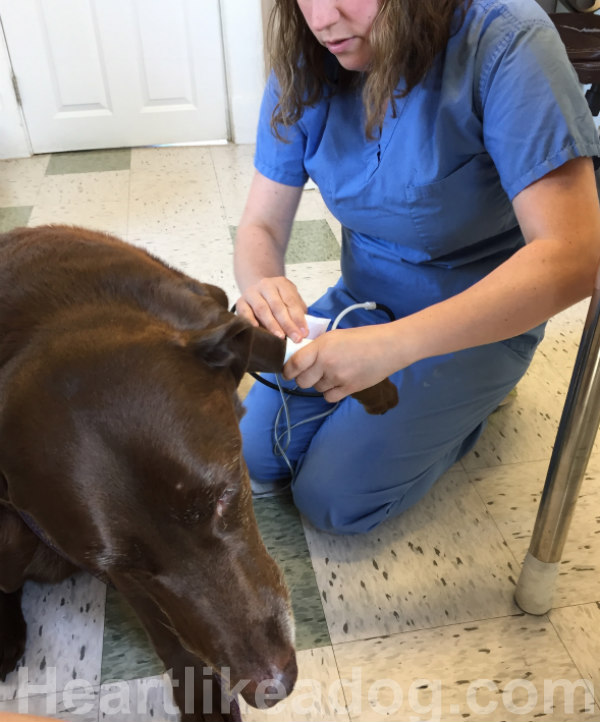
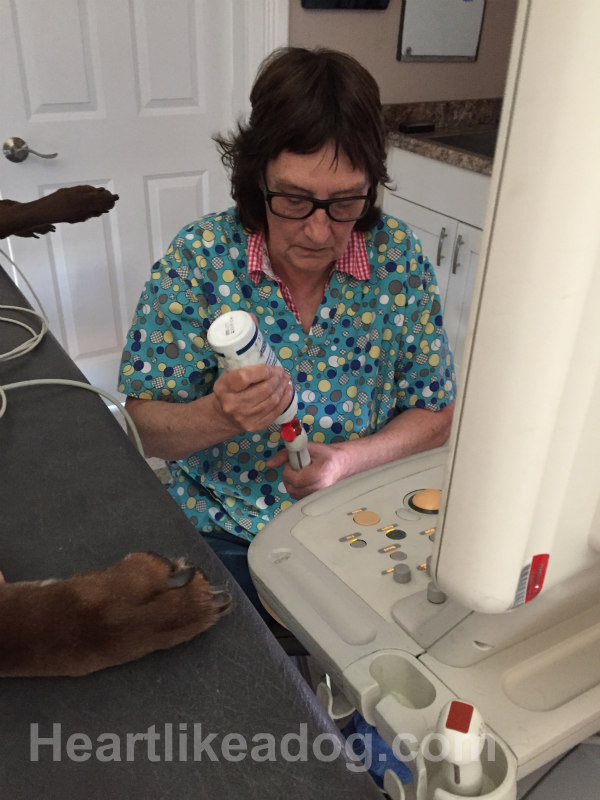
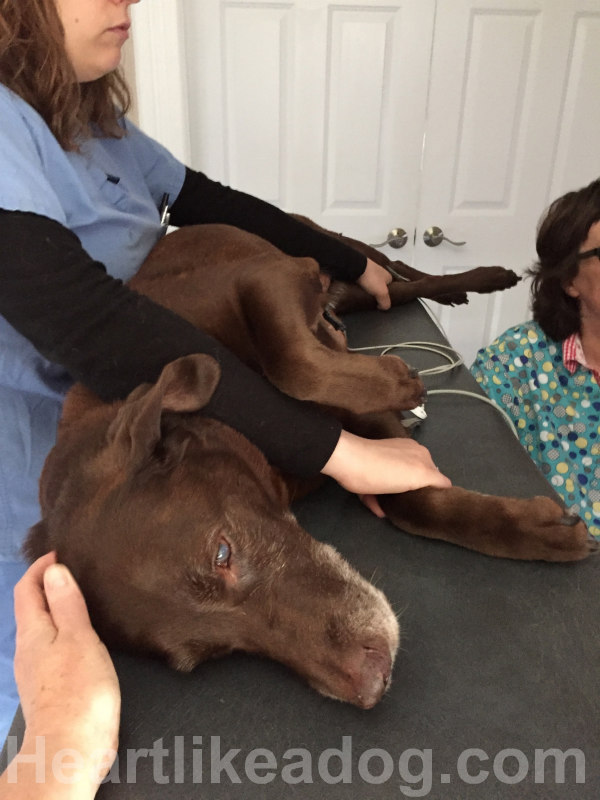
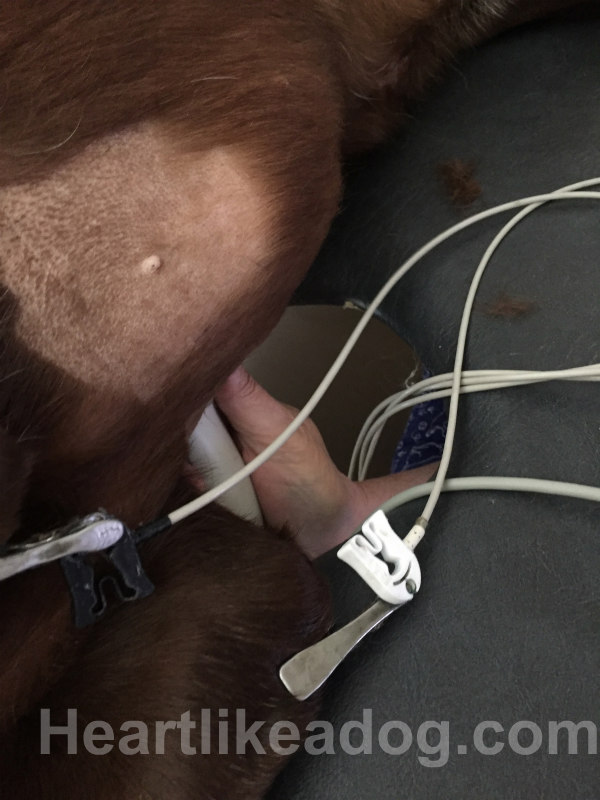
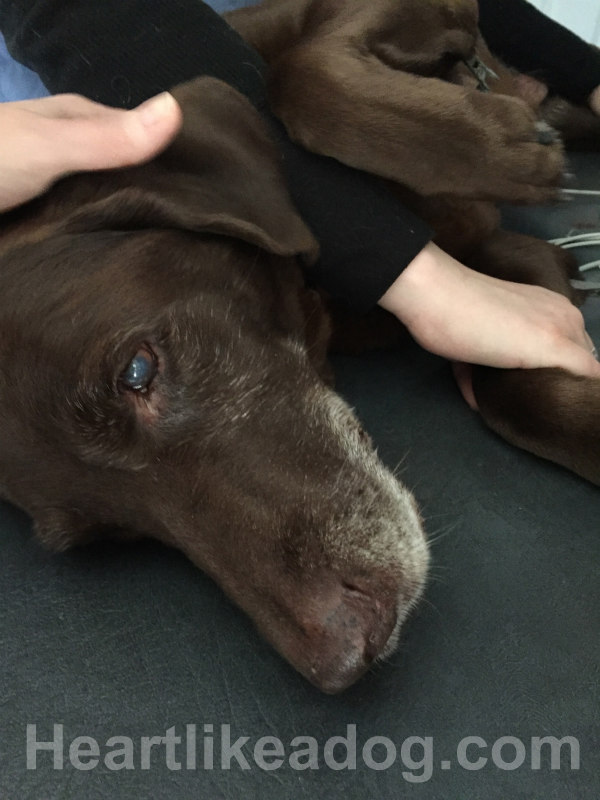
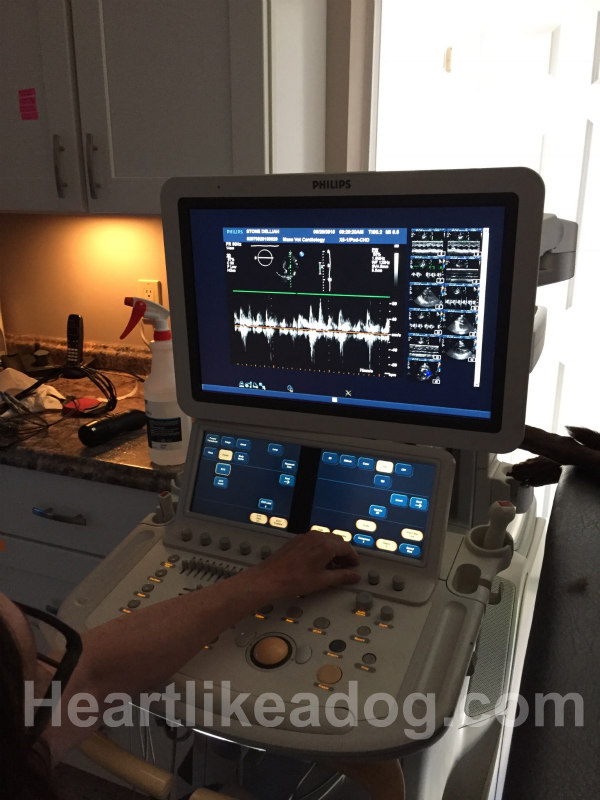

Not being able to pinpoint an exact diagnosis can be very frustrating for sure; but, I remember our vet saying almost the exact same thing about Ducky’s IBS when we were spending time and money on barium tests, x-rays, and drugs a few years ago. So, I can totally relate to what you’re going through. And it sounds like the Sotalol is working, which makes me think the cardiologist is spot-on about the prominence. Plus, Angel Callie is watching over your girl for us so I’m sure everything will be okay. ❤️
You are doing the right thing. I went for those tests with Katie just thinking the cause of her arrhythmia would be found, we would get meds and all would be good, but it was clearly a tumor causing the issues. There is no way to treat a tumor in the heart and they are very rare, which is a good thing. I’m glad things went better for you guys. I know it is expensive but I feel it is worth it. Hopefully it will just be the arrhythmia and you can get that under control.
I know the frustration of not having clear answers well! I hope that you get some results that answer your questions soon–the not knowing is worse than anything, I think. Hang in there!
That is frustrating, and scary. Hopefully the follow up will be good, and it’s not anything dramatically serious.
How stressful but it does sound like Delilah is in good paws with that cardiologist. We’re sure sending tons of prayers to her and to you too.
Knowing there is a problem is one step toward solving it. Our paws are crossed that all will be well.
It’s so terrifying to know know exactly what the cause is and to have to wait. The waiting game is agonizing. Think you’re doing all the very best things for Delilah and that’s all you can do. Sending hugs and prayers!
Holy cow, Jodi. That’s all so incredible. As my own dogs age, I find vets rule out more than they diagnose. The practice of medicine for pets seems to be more of a ruling out discipline than anything. We’ll keep our paws crossed all goes well with the monitoring and are buoyed by the repeat EKG. Hopefully there will be more good news. Please give D-Girl an extra ear scratch from me. Oh, and maybe an extra treat for having to endure having her temperature taken. 😉
We always wish – and expect, that medical science is an exact science and often it is not. It’s frustrating not knowing, and having to wait to know more. But it certainly sounds like things are moving in the right direction for Delilah. Our hearts and prayers are with you – we know how tough that is.
Is an arrhythmia different than a murmur?
Thank you, I know you know.
Yes, an arrhythmia is extra heartbeats, whereas a murmur is when the heart contracts and bit of blood goes out the valve.
My thoughts are with you and the pups. Hopefully they figure out what’s wrong with her soon and that it’s not anything too serious ❤